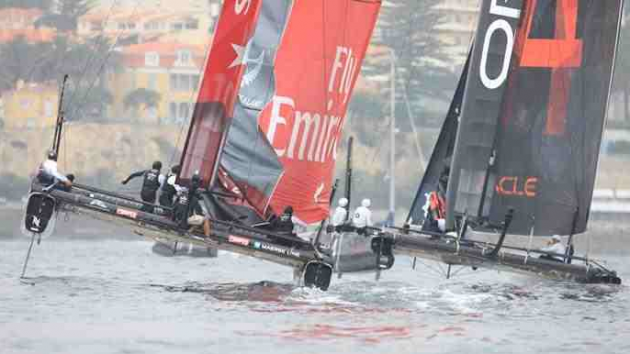Day 1 of the new generation of America’s Cup racing got underway in Cascais
The opening races of the America’s Cup World Series – Cascais lived up to the promise of creating close, tactical racing among some of the world’s best sailors.
Under unusually overcast and foggy conditions and in very light winds, three fleet races marked the beginning of the pursuit of sport’s oldest trophy. Despite the extremely light and variable conditions, the wing-sailed AC45 catamarans proved competitive racing was possible in winds as light as three knots (5 kph).
Emirates Team New Zealand was the class act of the nine-boat fleet over the three races and finished the day with a one-point lead over the Swedish Artemis Racing.
“Racing is very different in light winds but it’s really good that these boats can sail in this weather,” Kiwi skipper Dean Barker said. “We are happier with more wind… but with the lighter winds, all the teams leveled. The lack of wind becomes an equalizer. Today all the teams have had their opportunity, so it becomes more competitive.”
Six points further down the leaderboard, in fourth place, was ORACLE Racing Spithill, skippered by James Spithill. His crew, although one point behind stablemate ORACLE Racing Coutts, could claim two race victories. The only thing holding them back was a disqualification in the first race, for crossing outside the course boundaries, and not taking the appropriate penalty.
“We had a problem, our screen (signaling the penalty) blanked out,” Spithill explained. “Apparently we were over the course boundary before the start. And we got a penalty with two minutes to go. But our screen came back on during the first run. Too late for us to do anything but… that’s alright. We just had a couple of problems, sorting out the bugs in the system. But I thought it was a great day.”
This was the first time all nine of the wing-sailed AC45 catamarans were on the same race course and the result was some incredible action on the starting line. The more experienced teams demonstrated impressive acceleration at the start gun, which they were able to convert to into leads around the first mark.
For the less experienced teams, the lighter conditions allowed them to focus less on crew work and more on tactics, which translated into a tight leaderboard at the end of the day.
Racing was held close to shore, with the spectator fleet defining the narrow course boundaries. This was America’s Cup racing up close and personal. The racing was also streamed live at www.americascup.com and on the America’s Cup YouTube channel, with over 37,000 views. Archived races will be available on demand online Saturday night (GMT).
The AC World Series – Cascais continues on Sunday with one longer fleet race as well as the AC500 Speed Trial, a timed test for the crews over a 500-meter race track.
The forecast is for more traditional Cascais conditions to return, with moderate to strong winds by race time. The fleet race is scheduled to start at 1445 local time (GMT+1).




